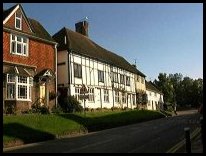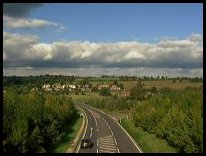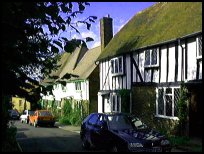| |

|
|
|
| |
 Robertsbridge in East Sussex is an old settlement probably founded
about 1176, when the only Cistercian Abbey in Sussex was
built on the site of the current War Memorial . Remnants
of the old chapel cellar from the monastry can still
be seen in the basement of one of the houses in the high street . Robertsbridge in East Sussex is an old settlement probably founded
about 1176, when the only Cistercian Abbey in Sussex was
built on the site of the current War Memorial . Remnants
of the old chapel cellar from the monastry can still
be seen in the basement of one of the houses in the high street .
The village remained when the abbey was moved about 1 mile to the
East to the village of Salehurst in 1210.
It is believed that the name of the village was
derived from the bridge built by the 1st abbot -
Robert de St Martin, abbey records show it as
'Pons Roberti' which translates from the Latin
to The Bridge of Robert.
In 1193 Richard the Lionheart was returning from
the 3rd Crusade across Europe, when he was captured
by Duke Leopold of Austria, and handed over to the
Holy Roman Emperor who imprisoned him. Abbot
William of Robertsbridge Abbey was commisioned by
Parliament to find the King. He was located in the
Castle of Derstein in Bavaria, and William
successfully negotiated his release for 150,000
marks.
The main business of the village was as a stopping
and resting place for travellers from Hastings to
London. The large numbers of late 14th and 15th
Century Wealden Hall Houses show a period of wealth
possibly due to the weekly market that was granted
the village by Henry III in 1254.
Henry III visited the Abbey in 1225 and 1264, and
Edward II in 1295 and 1297, staying in the village.
Robertsbridge Abbey was an important place as the body of Sir John Pelham
and his wife were buried here and also Sir Edward Dalyngrigge
( builder of Bodiam castle ) together with his wife.
In 1541 a forge was built by the Churchill family
on the old Abbey grounds at Salehurst , this was
supplemented by a furnace in 1754. The manufactured
goods were despatched from Bodiam bridge, the furthest
navigable point up the river Rother. The main production
of the furnace was of cannons manufactured by melting
down other guns rejected by the navy or from pig iron.
The use of pre manufactured iron as a raw material
ensured the quality of the castings were better.
In 1740, at Silver Hill between Hurst Green and
Robertsbridge a Revenue Officer Thomas Carswell
was shot and killed while trying to apprehend
some of the smugglers from the Hawkhurst Gang .
During the 1700 and 1800's women's stays were
manufactured in the area, and flour milling was
carried out, together with the manufacture of guns
for the navy. The area was also well known for
smuggling , and the robbing of travellers.
In the late 1800's cricket bats and equipment were
manufactured by Gray Nichols, whose factory is
still in the village.
Finally the very first Cub Scout Pack was started
in Robertsbridge by Baden Powell.
This village is associated with the Sussex Bonfire Societies , who provide
noisy processions, unbelievable outfits and fantastic firework displays throughout
the month of November - a spectacle not to be missed. |
|
 Robertsbridge in East Sussex has a beautiful main high street
containing many Wealden Hall Houses, and older
dwellings. Robertsbridge in East Sussex has a beautiful main high street
containing many Wealden Hall Houses, and older
dwellings.
If you walk up Fair Lane, to the left
of the Seven Stars Public House, and onto the
footbridge over the A21, a wide vista of the Rother
valley leading to the Church at Salehurst is
visible. |
|
 Robertsbridge in East Sussex has quite a few local services, for
transport the main A21 London to Hastings road
provides reasonable links to Hastings(10 miles
South), and Tunbridge Wells (15 miles North West),
the main local Towns.
The main London to Hastings Train Line stops in
the village providing a 1 hour 15 minute journey
to Cannon Street and Charing Cross. This service
runs approximately every 20 minutes in the rush
hour, and hourly in between. Robertsbridge in East Sussex has quite a few local services, for
transport the main A21 London to Hastings road
provides reasonable links to Hastings(10 miles
South), and Tunbridge Wells (15 miles North West),
the main local Towns.
The main London to Hastings Train Line stops in
the village providing a 1 hour 15 minute journey
to Cannon Street and Charing Cross. This service
runs approximately every 20 minutes in the rush
hour, and hourly in between.
The main Hawkhurst to Battle bus service stops
in the village providing a frequent service.
A number of Public Houses, and Various shops are
available in the village.
The main shopping centres are in Hastings and
Tunbridge Wells , with a minor one in Battle . |
|
| Robertsbridge is shown as the red symbol on the map. |
|
|
Nearby Villages
(click on symbol to see the village page) |
| Village= | |
Town= | |
Recorded in Domesday= |  |
| |
|
|
Bodiam |
(The finest ruined castle in the Country) | | 3.09 miles |
|
|
Brede |
(Edward I inspects the Channel Fleet) | | 6.42 miles |
|
|
Brightling |
(famous for Mad Jack Fuller) | | 3.56 miles |
|
|
Broad Oak Brede |
(On the Crossroads) | | 6.02 miles |
|
|
Burwash |
(The home of Rudyard Kipling) | | 3.81 miles |
|
|
Burwash Common |
(Roughest pub in the South East) | | 5.76 miles |
|
|
Burwash Weald |
(Roughest pub in the South East) | | 5.32 miles |
|
|
Cripps Corner |
(Home Guard surprises the Army) | | 2.92 miles |
|
|
Dallington |
(Custers Last Stand!) | | 5.71 miles |
|
|
Etchingham |
(The oldest Brass Weather Vane in the country) | | 2.21 miles |
|
|
Ewhurst Green |
(Great Fire of London contributions) | | 3.61 miles |
|
|
Hurst Green |
(The Youngest Highwayman on record) | | 2.26 miles |
|
|
Mountfield |
(17th Century Coal !!) | | 2.06 miles |
|
|
Netherfield |
(Village at the top of the Hill) | | 3.48 miles |
|
|
Newenden |
(Alfred the Great's Fort) | | 6.51 miles |
|
|
Northiam |
(Prime Ministers D Day inspection) | | 5.59 miles |
|
|
Punnetts Town |
(The Windmill on the Hill) | | 6.92 miles |
|
|
Salehurst |
(Richard the Lion Heart's Gift) | | 0.90 miles |
|
|
Sandhurst |
(Escape from the Great Plague) | | 4.88 miles |
|
|
Sedlescombe |
(Best gunpowder in Europe) | | 4.49 miles |
|
|
Staplecross |
(Mothers grudge hangs son) | | 2.89 miles |
|
|
Stonegate |
(Ancient Roman Cross Road) | | 5.31 miles |
|
|
Whatlington |
(King Harold's Manor) | | 3.56 miles |
|
|
| Copyright Villagenet 1998-2025 | |
| |
|
|
Local Interest
Just click an image |
|
|
|
|
|
|
|
|
|
|
|
|
|
|
| |